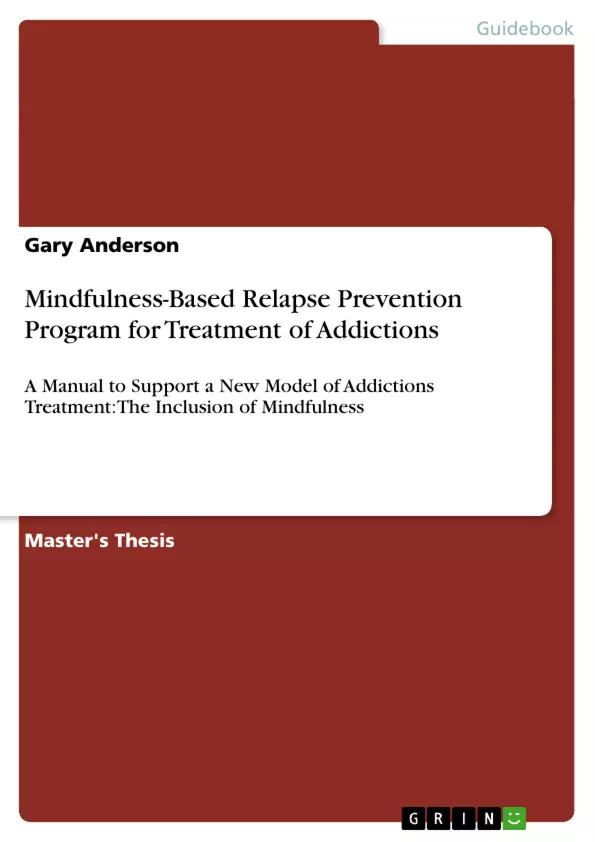
Mindfulness-Based Relapse Prevention Program for Treatment of Addictions
Masterarbeit, 2007
207 Seiten
Leseprobe
Inhaltsverzeichnis (Table of Contents)
- PART I: MINDFULNESS AND ADDICTIONS
- Chapter I: The Background
- Introduction
- Complimentary and Alternative Medicine in Therapy
- Spirituality in Treatment
- Chapter II: Mindfulness
- Introduction
- Buddhist Psychology
- Transcendental Meditation
- Mindfulness or Insight Meditation
- Defining Mindfulness in Western Psychology
- Mindfulness-Based Stress Reduction
- Mindfulness-Based Cognitive Therapy
- Research Evidence for the Use of Mindfulness Treatment
- Mindfulness and Neurology
- A Synopsis
- Chapter III: Addiction
- Introduction
- The Scope of the Problem
- The Neurology of Addiction
- Current Models of Addiction Treatment
- Research
- A Synopsis
- Chapter IV: The Issue of Relapse
- Introduction
- What is Relapse?
- Relapse Prevention
- A New Model of Relapse Prevention
- Mindfulness-Based Relapse Prevention
- Supporting the Facilitator
- The Participant's Manual
- PART II - PARTICIPANT'S MANUAL
- Course Outline and Readings
Zielsetzung und Themenschwerpunkte (Objectives and Key Themes)
This manual explores the application of mindfulness in the treatment of addiction and relapse prevention. It aims to provide a comprehensive overview of mindfulness and its role in therapeutic interventions, particularly in the context of addiction recovery.
- The integration of mindfulness into addiction treatment models
- The theoretical framework for mindfulness-based relapse prevention
- The development of a practical manual for implementing mindfulness-based interventions in addiction treatment
- The neurological underpinnings of addiction and mindfulness
- The role of spirituality and alternative medicine in addiction recovery
Zusammenfassung der Kapitel (Chapter Summaries)
Chapter I provides a comprehensive overview of mindfulness and its integration into addiction treatment. It delves into the historical development of mindfulness, exploring its roots in Buddhist psychology and its evolution in Western psychology. The chapter also examines the role of spirituality and alternative medicine in addiction recovery, highlighting the potential benefits of these approaches.
Chapter II further examines mindfulness, exploring its definition in Western psychology and its application in various therapeutic interventions. The chapter discusses the evidence supporting the use of mindfulness treatment, emphasizing its potential to reduce stress, improve emotional regulation, and prevent relapse. This chapter also reviews the neural pathways involved in mindfulness and addiction, providing a neurobiological perspective on these phenomena.
Chapter III focuses on the nature of addiction, outlining its prevalence and exploring its neurobiological underpinnings. It also examines current models of addiction treatment, exploring the limitations of traditional approaches and the need for innovative interventions. This chapter provides a foundation for understanding the challenges of addiction and the rationale for incorporating mindfulness into treatment.
Chapter IV delves into the issue of relapse in addiction, defining the concept and exploring various relapse prevention strategies. It introduces a new model of relapse prevention based on mindfulness, emphasizing the role of awareness, acceptance, and self-compassion in managing cravings and promoting long-term recovery. The chapter concludes by outlining the key elements of a mindfulness-based relapse prevention program, providing guidance for practitioners and participants alike.
Schlüsselwörter (Keywords)
This manual focuses on the intersection of mindfulness and addiction treatment. It explores key concepts such as mindfulness-based relapse prevention, addiction neurology, spirituality in treatment, and the integration of alternative medicine practices into addiction recovery. It also examines the impact of mindfulness on the brain and its potential to reduce stress and promote emotional regulation in individuals recovering from addiction.
Details
- Titel
- Mindfulness-Based Relapse Prevention Program for Treatment of Addictions
- Untertitel
- A Manual to Support a New Model of Addictions Treatment: The Inclusion of Mindfulness
- Veranstaltung
- Masters of Counselling Psychology
- Autor
- Gary Anderson (Autor:in)
- Erscheinungsjahr
- 2007
- Seiten
- 207
- Katalognummer
- V197313
- ISBN (eBook)
- 9783656875956
- ISBN (Buch)
- 9783656875963
- Dateigröße
- 2281 KB
- Sprache
- Englisch
- Schlagworte
- Mindfulness Addiction Relapse Prevention Applied Psychology
- Produktsicherheit
- GRIN Publishing GmbH
- Preis (Ebook)
- US$ 26,99
- Preis (Book)
- US$ 36,99
- Arbeit zitieren
- Gary Anderson (Autor:in), 2007, Mindfulness-Based Relapse Prevention Program for Treatment of Addictions, München, Page::Imprint:: GRINVerlagOHG, https://www.diplomarbeiten24.de/document/197313
- Autor werden
- Ihre Optionen
- Vertriebskanäle
- Premium Services
- Autorenprofil
- Textarten und Formate
- Services für Verlage, Hochschulen, Unternehmen

- © GRIN Publishing GmbH.
- Alle Inhalte urheberrechtlich geschützt. Kopieren und verbreiten untersagt.
- info@grin.com
- AGB
- Open Publishing
Der GRIN Verlag hat sich seit 1998 auf die Veröffentlichung akademischer eBooks und Bücher spezialisiert. Der GRIN Verlag steht damit als erstes Unternehmen für User Generated Quality Content. Die Verlagsseiten GRIN.com, Hausarbeiten.de und Diplomarbeiten24 bieten für Hochschullehrer, Absolventen und Studenten die ideale Plattform, wissenschaftliche Texte wie Hausarbeiten, Referate, Bachelorarbeiten, Masterarbeiten, Diplomarbeiten, Dissertationen und wissenschaftliche Aufsätze einem breiten Publikum zu präsentieren.
Kostenfreie Veröffentlichung: Hausarbeit, Bachelorarbeit, Diplomarbeit, Dissertation, Masterarbeit, Interpretation oder Referat jetzt veröffentlichen!
- GRIN Verlag GmbH
-
- Nymphenburger Str. 86
- 80636
- Munich, Deutschland
- +49 89-550559-0
- +49 89-550559-10
- info@grin.com
-









